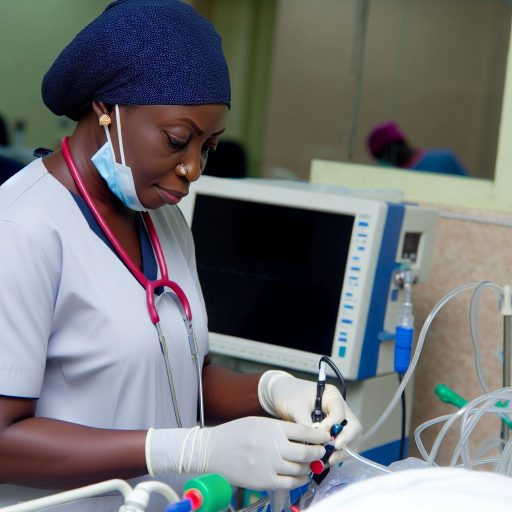Introduction:
– Spinal cord injuries are prevalent in Nigeria, affecting many individuals each year.
– Rehabilitation plays a crucial role in improving the quality of life for those with spinal cord injuries.
– However, accessing rehabilitation services in Nigeria is often challenging due to various barriers.
Causes of Spinal Cord Injuries in Nigeria:
Spinal cord injuries in Nigeria can occur due to various reasons.
Some of the common causes being:
- Road Traffic Accidents:
- Falls:
- Violence:
One of the leading causes of spinal cord injuries in Nigeria is road traffic accidents.
The high prevalence of road accidents due to poor road infrastructure, reckless driving, and lack of proper traffic regulations contributes significantly to these injuries.
Falls from heights, slippery floors, or uneven surfaces are another common cause of spinal cord injuries in Nigeria.
These accidents often happen in construction sites, homes, or workplaces, leading to severe injuries.
Acts of violence, including gunshots, stabbings, and physical assaults, can result in spinal cord injuries.
These incidents are more prevalent in certain regions of Nigeria with high crime rates, posing a significant risk to individuals.
Impact of These Causes on Individuals and Society:
The causes mentioned above not only have a profound impact on individuals but also on society as a whole.
- Individual Impact:
- Societal Impact:
- Psychosocial Impact:
Individuals who suffer from spinal cord injuries face physical, emotional, and financial challenges.
These injuries often lead to paralysis, loss of motor function, chronic pain, and psychological trauma, affecting the quality of life of the affected individuals.
Spinal cord injuries impose a significant burden on the healthcare system and the economy.
The cost of treatment, rehabilitation, and long-term care for individuals with spinal cord injuries can be substantial, straining healthcare resources and affecting the productivity of the workforce.
Spinal cord injuries can also have a psychosocial impact on individuals and their families.
The stigma associated with disabilities, limited access to specialized care and support services, and societal barriers can further exacerbate the challenges faced by individuals with spinal cord injuries.
Addressing the causes of spinal cord injuries in Nigeria requires a comprehensive approach.
This approach should focus on preventive measures, improving road safety, enhancing healthcare infrastructure, and increasing awareness about the consequences of these injuries.
By taking proactive steps to mitigate the risks associated with these causes, we can reduce the incidence of spinal cord injuries.
We can create a more inclusive and supportive society for individuals living with such injuries.
Rehabilitation for Spinal Cord Injuries
Rehabilitation plays a crucial role in the recovery process of individuals with spinal cord injuries.
It encompasses various components that aim to improve the overall well-being and independence of the patient.
Components of Rehabilitation
- Physical Therapy: This component focuses on improving mobility, strength, and range of motion through specialized exercises and techniques.
- Occupational Therapy: Occupational therapists help patients regain skills for daily activities such as dressing, cooking, and working.
- Vocational Training: This component aids in preparing individuals to re-enter the workforce by providing job skills training and guidance.
Importance of Early Intervention
Early intervention is crucial in the rehabilitation process for spinal cord injuries.
It can significantly impact the outcome of recovery.
Prompt and effective care can prevent complications and promote better long-term functioning.
Comprehensive Care for Optimal Recovery
A comprehensive rehabilitation program addresses the physical, emotional, and psychological needs of individuals with spinal cord injuries.
It involves a multidisciplinary team of professionals working together to provide individualized care.
By combining these various components of rehabilitation, individuals with spinal cord injuries can achieve a higher level of independence and quality of life.
The goal is to maximize functional abilities and promote overall well-being for a successful recovery.
Find Out More: Career Path in Oral and Maxillofacial Surgery in Nigeria
Challenges in Accessing Rehabilitation Services in Nigeria
When it comes to accessing rehabilitation services for spinal cord injuries in Nigeria, there are several challenges that individuals face.
These challenges contribute to the overall difficulty in providing adequate care and support for those in need.
Lack of Specialized Rehabilitation Centers and Trained Professionals
- One of the major obstacles in accessing rehabilitation services in Nigeria is the scarcity of specialized centers equipped to handle spinal cord injuries.
- Due to the limited number of facilities, patients often have to travel long distances to receive treatment, which can be extremely inconvenient and exhausting.
- Moreover, there is a shortage of trained professionals in the country who have the expertise to provide comprehensive care for individuals with spinal cord injuries.
Financial Constraints and Lack of Awareness
- Another significant barrier to accessing rehabilitation services is the financial burden associated with treatment and care.
- Many individuals in Nigeria struggle to afford the high costs of rehabilitation, including therapy sessions, medical equipment, and medications.
- Furthermore, there is a general lack of awareness about spinal cord injuries and the importance of rehabilitation in the country.
- As a result, individuals may not know where to seek help or how to navigate the healthcare system effectively.
The challenges in accessing rehabilitation services for spinal cord injuries in Nigeria are multi-faceted and complex.
Addressing these issues requires a concerted effort from the government, healthcare providers, and community organizations to improve access to quality care for individuals in need.
Discover More: Technological Advancements in Biomedical Tech Nigeria
Government Initiatives and Policies on Rehabilitation for Spinal Cord Injuries:
There are several existing government programs and policies in Nigeria aimed at improving rehabilitation services for individuals with spinal cord injuries.
These initiatives play a crucial role in supporting and facilitating the recovery process for those affected by such injuries.
Current Government Programs:
- National Health Insurance Scheme (NHIS): Provides coverage for medical treatments related to spinal cord injuries.
- National Rehabilitation Centre (NRC): Offers specialized care and rehabilitation services for individuals with spinal cord injuries.
- National Disability Empowerment Fund: Provides financial support for rehabilitation and assistive devices for persons with disabilities.
- National Health Act: Mandates the provision of rehabilitation services for individuals with disabilities, including spinal cord injuries.
Evaluation of Effectiveness:
- The government initiatives have helped in increasing access to rehabilitation services for individuals with spinal cord injuries.
- However, there are still challenges such as limited funding, inadequate infrastructure, and a lack of trained professionals in this field.
- There is a need for improved coordination between different government agencies and healthcare providers to enhance the effectiveness of these programs.
- More emphasis should be placed on preventive measures and community-based rehabilitation to reduce the burden of spinal cord injuries.
Areas for Improvement:
- Increased funding allocation for rehabilitation services to ensure adequate resources for treatment and support programs.
- Enhanced training programs for healthcare professionals to improve the quality of care and support provided to individuals with spinal cord injuries.
- Implementation of comprehensive policies that address the socio-economic challenges faced by individuals with disabilities, including spinal cord injuries.
- Collaboration with non-profit organizations and international partners to leverage resources and expertise in the field of spinal cord injury rehabilitation.
By addressing the existing challenges and focusing on areas for improvement, the government can better support the recovery and well-being of individuals living with spinal cord injuries in the country.
Transform Your Career with Expert Guidance
Get personalized mentorship consulting that’s tailored to your unique path. Our expert advice is actionable and exclusive.
Get StartedYou Might Also Like: Preventive Dentistry and Diabetes Management
Role of Non-Profit Organizations and Advocacy Groups in Supporting Rehabilitation Efforts:
Non-profit organizations and advocacy groups play a crucial role in supporting rehabilitation efforts for individuals with spinal cord injuries in Nigeria.
These organizations are dedicated to raising awareness about spinal cord injuries, providing support to patients and their families, and advocating for better rehabilitation services.
By working collaboratively with healthcare providers, government agencies, and other stakeholders, NGOs and advocacy groups are able to address the unique challenges faced by individuals with spinal cord injuries.
Contributions of NGOs and Advocacy Groups:
- Providing financial assistance for rehabilitation services.
- Offering counseling and emotional support to patients and their families.
- Advocating for policy changes to improve access to quality care.
- Organizing community outreach programs to educate the public about spinal cord injuries.
- Supporting research initiatives to advance treatment options for spinal cord injuries.
Success Stories and Impact of Organizations:
- NGOs and advocacy groups have been instrumental in empowering individuals with spinal cord injuries to lead fulfilling lives.
- Through their efforts, many patients have regained mobility, independence, and confidence.
- These organizations have also played a role in breaking down stigma and discrimination associated with spinal cord injuries.
- By highlighting success stories, they inspire hope and resilience among patients and their families.
- The impact of these organizations extends beyond individual patients to influence systemic changes in the healthcare landscape.
Uncover the Details: Importance of Orthopaedic Tech in Nigerian Healthcare

Impact of Spinal Cord Injuries on Mental Health
Spinal cord injuries can have devastating effects on mental health.
They can cause feelings of depression, anxiety, and isolation.
Emotional and Psychological Challenges
Individuals with spinal cord injuries often struggle with adjusting to their new reality.
This can lead to a range of emotional and psychological challenges.
- Depression: Many individuals experience feelings of sadness and hopelessness following a spinal cord injury.
- Anxiety: The uncertainty of the future and the loss of independence can trigger anxiety in patients.
- Isolation: Limited mobility and social stigma can lead to feelings of isolation and loneliness.
The Need for Psycho-Social Support Services
It is crucial to recognize the importance of psycho-social support services in the rehabilitation process for spinal cord injuries.
- Counseling: Professional counseling can help individuals cope with the emotional impact of their injury and develop healthy coping strategies.
- Support Groups: Connecting with others facing similar challenges through support groups can provide a sense of community and understanding.
- Peer Mentoring: Peer mentoring programs allow individuals to learn from those who have successfully navigated the challenges of spinal cord injuries.
Role of Counseling in Spinal Cord Injury Rehabilitation
Counseling plays a crucial role in helping individuals with spinal cord injuries address their emotional and psychological needs.
- Emotional Support: Counselors provide a safe space for patients to express their feelings and process their emotions.
- Coping Strategies: Counselors help patients develop effective coping strategies to manage stress and anxiety.
- Goal Setting: Setting achievable goals with the help of a counselor can motivate patients to stay positive and focused on their recovery.
Benefits of Support Groups in Spinal Cord Injury Rehabilitation
Support groups offer unique benefits to individuals with spinal cord injuries, fostering a sense of belonging and empowerment.
- Peer Support: Sharing experiences with others who understand their challenges can provide comfort and validation.
- Information Sharing: Support groups offer valuable insights and resources on coping mechanisms and adaptive strategies.
- Networking Opportunities: Building connections with peers in support groups can open up opportunities for social engagement and advocacy.
Importance of Peer Mentoring in Spinal Cord Injury Rehabilitation
Peer mentoring programs play a vital role in helping individuals with spinal cord injuries navigate the physical, emotional, and social hurdles of rehabilitation.
- Role Models: Peer mentors offer inspiration and practical guidance based on their own experiences living with spinal cord injuries.
- Empowerment: By seeing the accomplishments of peer mentors, individuals with spinal cord injuries are motivated to set and achieve their own goals.
- Community Building: Peer mentoring fosters a sense of community and mutual support among individuals facing similar challenges.
Innovative Approaches to Rehabilitation for Spinal Cord Injuries
Rehabilitation for spinal cord injuries in Nigeria has seen significant advancements in recent years.
Innovative approaches are being introduced to enhance the outcomes of rehabilitation for individuals with spinal cord injuries.
One of the key areas where innovation is making a difference is in the use of emerging technologies and interventions.
Assistive devices play a crucial role in helping individuals with spinal cord injuries regain independence and mobility.
Devices such as wheelchairs, walking aids, and orthoses are being continuously improved to provide better support and functionality for patients.
Virtual reality (VR) has emerged as a promising tool in rehabilitation for spinal cord injuries.
VR technology allows patients to engage in interactive and immersive environments that can simulate real-life activities.
This helps in improving motor skills, coordination, and overall functional abilities.
Robotics is another area that is revolutionizing rehabilitation for spinal cord injuries.
Robotic exoskeletons and robotic-assisted therapy devices are being used to provide intensive and targeted rehabilitation to patients.
These devices can assist patients in walking, standing, and performing various exercises to improve muscle strength and coordination.
The potential of telemedicine in reaching underserved populations in Nigeria is immense.
Telemedicine allows healthcare professionals to remotely monitor and provide rehabilitation services to individuals with spinal cord injuries who may not have easy access to specialized care.
This can help bridge the gap between urban centers where specialized rehabilitation facilities are located and rural areas where healthcare resources are limited.
Remote rehabilitation services are also becoming more prevalent in Nigeria.
These services enable patients to receive therapy and support from the comfort of their homes.
This not only increases convenience for patients but also reduces the burden of travel and associated costs.
The innovative approaches to rehabilitation for spinal cord injuries in Nigeria are paving the way for better outcomes and improved quality of life for patients.
By embracing technologies such as assistive devices, virtual reality, robotics, telemedicine, and remote rehabilitation services, healthcare providers can cater to the diverse needs of individuals with spinal cord injuries.
These innovative methods help patients on their journey to recovery.
Importance of Rehabilitation for Spinal Cord Injury Patients
Rehabilitation plays a crucial role in the recovery and quality of life for individuals with spinal cord injuries in Nigeria.
It not only helps in physical recovery but also enhances psychological well-being.
The significance of rehabilitation cannot be overstated.
It significantly improves outcomes and increases the independence of patients.
Investing in these services is essential for the long-term well-being of individuals with spinal cord injuries.
Stakeholders in the healthcare sector, government, and non-governmental organizations must prioritize these services.
We need to ensure that all individuals with spinal cord injuries have access to comprehensive care and support.
By providing adequate resources and support for rehabilitation programs, we can help individuals regain mobility.
We can also improve their quality of life and reintegrate them into society as active and productive members.
Let’s join hands and work towards a future where rehabilitation services for spinal cord injury patients are a fundamental right.
Together, we can make a difference in the lives of individuals affected by spinal cord injuries in Nigeria.
Additional Resources
The challenge of spinal cord injury care in the developing world – PMC
The Epidemiology of Spinal Neurosurgery in Nigeria: A Systematic …




